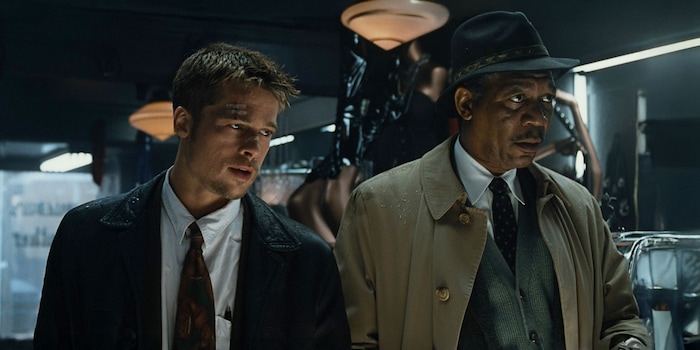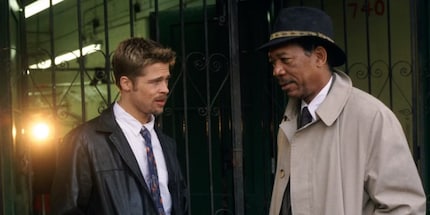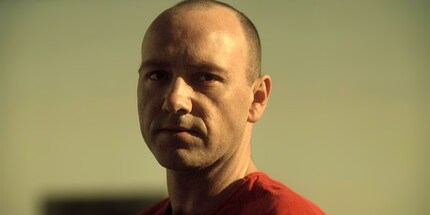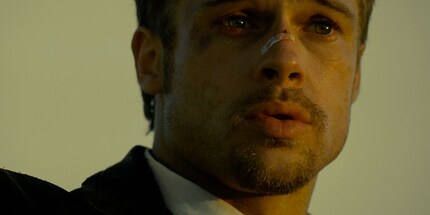
Background information
The Matrix in IMAX – ready for the red pill?
by Luca Fontana

30 years after it premiered, Se7en returns to IMAX cinemas. And with it, deeply disturbing questions that have been lingering in our minds for decades: can a world like this still be saved?
«The world is a fine place,» Ernest Hemingway once wrote, «and worth fighting for.» Detective William Somerset, played by Morgan Freeman, only agrees with the second part. The electricity pylons across the suburban steppe are barely visible; dusk has almost turned to night. The crime that’s just taken place will be etched in his memory forever.
This is how Se7en ends.
I vividly remember watching David Fincher’s masterpiece for the first time in my early teens. I was shocked to the core. And yet I knew what I’d just witnessed. A perfect film. Great script. Fantastic actors. Outstanding direction. And perhaps the best detective story ever told.
This January, Se7en returns to cinemas to mark its 30th anniversary. Not in any old format, but in impressive IMAX – for the first time in its history. In cooperation between Digitec Galaxus, Pathé Switzerland and The Ones We Love – and with the kind support of Warner Bros. – the film will also be shown in all Pathé cinemas with an IMAX screen in Switzerland. Tickets and an overview of screening dates are available here.. The movie will be shown in English and without subtitles.
Get your tickets for a cinema near you here:
While I’m crazy excited about this re-release, I can’t help but wonder what it is about the film that continues to fascinate me.
Here’s my attempt at explaining why – with spoilers.
First, there’s this city. Gloomy, dirty and oppressive – an omnipresent, claustrophobic threat. Fincher doesn’t give it a name nor has he set it in any particular time. There are no mentionable landmarks or cultural features. Instead, the city’s dominated by endless streets and soulless apartment blocks. Some of them are inhabited, others abandoned. The only thing that connects the grey blocks is a constant stream of traffic and alleys full of shady, down-and-out characters and never-ending rain.
Se7en isn’t set in a particular city, it’s set in every city.
And it’s a place where two men who couldn’t be more different meet. Detective Somerset (Morgan Freeman), a seasoned yet very tired professional, is about to go into a well-deserved retirement. The cynical old man just has to get through one more week. One goddamn week. Then his successor, the other man, Detective Mills (Brad Pitt), will take over. Mills has just moved to the city. He’s young, boisterous and ambitious. He’s joined by his wife Tracy (Gwyneth Paltrow), who visibly feels uncomfortable in the anonymous city.

On Mills’ first day, he and Somerset are called to a crime scene of the most disturbing kind: a 400-pound man has died of internal bleeding, his face pushed into a plate of spaghetti. He was forced to eat until the food made his stomach burst. The message this murder conveys is as cruel as it is precise:
gluttony.
When two more murders, no less disturbing, occur shortly afterwards, Somerset recognises the pattern: each crime’s based on one of the seven deadly sins. Pride, greed, envy, anger, lust, sloth and gluttony. And what about the series of murders? It’s not over yet.
Somerset and Mills’ investigations take them deeper and deeper into a dirty, rain-swept city full of decay and scum. The unforgiving tension between Somerset and Mills is the pulse that drives the film. On the one hand, there’s Somerset, tired and disappointed by the world, but guided by a deep integrity and sense of what’s right. On the other, there’s Mills: impulsive, naive and idealistic, and occasionally blinded by emotion. They’re two extremes that show us how fine the line between reason and despair is.
Between good and bad.
And if Se7en has done one thing, it’s raise the agonising question that’s been lingering in our minds to this day: how would we react to a world of such cruelty and decay? With stoic reason, overwhelming despair or with unbridled rage?
In the end, they both come face to face with the murderer himself. A man who’s as dangerous as he is calculating: John Doe, played truly diabolically by Kevin Spacey. At the time, this hit people hard. Spacey’s name was deliberately left out of all trailers and promotional material. He doesn’t even appear in the opening credits of the movie. It was such a shock that moviegoers couldn’t help but take a sharp, horrified breath when Spacey’s revealed as the movie’s sick antagonist.
Before that, he remains invisible for most of the movie, but his presence nevertheless effortlessly permeates every scene. Because John Doe’s no ordinary villain. He’s a warning of how far people are capable of taking their convictions if they choose to embark on a dark, twisted mission without morals. A wake-up call to society, forcing it to take a look at itself and be reminded of its values.
«We see a deadly sin on every street corner, in every home, and we tolerate it. We tolerate it because it’s common, it’s trivial. We tolerate it morning, noon, and night,» Doe explains in the movie. «Well, not anymore. I’m setting the example. What I’ve done is going to be puzzled over and studied and followed… forever.»

John Doe wants to punish anyone committing the seven deadly sins and create a better world – at any cost. It’s a lofty goal from his point of view. But what makes Doe truly terrifying isn’t just his intelligence or ruthlessness. It’s the fact he’s hit a nerve. He forces us to confront ourselves with the uncomfortable question of whether we’ve, indeed, lost sight of the values that should define us.
«We see a deadly sin on every street – and we tolerate it,» echoes in my mind.
Andrew Kevin Walker’s screenplay leaves viewers with this question without providing any simple answers. Instead, we see how Somerset and Mills react differently to Doe’s manipulation. It’s a commentary on how Walker views society and divides it into two categories. Somerset remains cool and keeps his wits about him, even when confronted with the most horrific aspects of humanity. Mills, on the other hand, becomes a victim of his emotions. Which side we take is up to us.
At the same time What’s in the box? burns itself into our collective movie memory.
So at the end of one of the most unforgettable moments in movie history, Mills does exactly what John Doe wanted: he loses control and shoots Doe. That was part of the plan. Doe was jealous of Mills. Jealous of the fact that Mills was loved and he wasn’t. That’s why he decapitated Mills’ wife and put her head in a box. He goes on to rub the fact that she was pregnant in Mills’ face, which Mills didn’t even know until then. In doing so, he submitted to the «divine» judgment of his victim.
With this final act, Mills not only redeemed Doe, but also sacrificed his own soul – and Doe proved to the world how easily we all break.

Is it this inevitable escalation that makes the end of Se7en resonate so much? Maybe. Or perhaps this is just one aspect. For me, it’s the tragedy. Why? Because the death of such a horrific, unscrupulous antagonist would usually be a reason to rejoice. But in this case, it’s John Doe who won in the end. His «masterpiece» is completed.
That’s what makes Se7en so shocking.
It’s not a simple story about good and evil, but one about humankind – about our mistakes, our weaknesses, our anger and our despair. A story in which the world itself seems like a remorseless enemy that seems to crush all hope. Somerset believed he could leave this world, which he thought was lost, behind him. But in his final days, he realises that the world is not lost. Not as long as people like Mills are in it. But without leadership from people who keep their wits about them, they too will perish. That’s why Somerset’s still needed. Maybe not forever. But for a while.
«We’ll take care of him,» the police captain says as Mills is taken away. «Whatever he needs,» Somerset replies. «Where you gonna be?» the captain finally asks. «Around,» Somerset sighs.
«I’ll be around.»
I write about technology as if it were cinema, and about films as if they were real life. Between bits and blockbusters, I’m after stories that move people, not just generate clicks. And yes – sometimes I listen to film scores louder than I probably should.
Interesting facts about products, behind-the-scenes looks at manufacturers and deep-dives on interesting people.
Show all